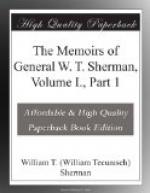From the resolutions of the bench, bar, and public generally, now in my possession, his death was universally deplored; more especially by his neighbors in Lancaster, and by the Society of Freemasons, of which he was the High-Priest of Arch Chapter No. 11.
His death left the family very poor, but friends rose up with proffers of generous care and assistance; for all the neighbors knew that mother could not maintain so large a family without help. My eldest brother, Charles, had nearly completed his education at the university at Athens, and concluded to go to his uncle, Judge Parker, at Mansfield, Ohio, to study law. My, eldest sister, Elizabeth, soon after married William J. Reese, Esq.; James was already in a store at Cincinnati; and, with the exception of the three youngest children, the rest of us were scattered. I fell to the charge of the Hon. Thomas Ewing, who took me to his family, and ever after treated me as his own son.
I continued at the Academy in Lancaster, which was the best in the place; indeed, as good a school as any in Ohio. We studied all the common branches of knowledge, including Latin, Greek, and French. At first the school was kept by Mr. Parsons; he was succeeded by Mr. Brown, and he by two brothers, Samuel and Mark How. These were all excellent teachers, and we made good progress, first at the old academy and afterward at a new school-house, built by Samuel How, in the orchard of Hugh Boyle, Esq.
Time passed with us as with boys generally. Mr. Ewing was in the United States Senate, and I was notified to prepare for West Point, of which institution we had little knowledge, except that it was very strict, and that the army was its natural consequence. In 1834 I was large for my age, and the construction of canals was the rage in Ohio. A canal was projected to connect with the great Ohio Canal at Carroll (eight miles above Lancaster), down the valley of the Hock Hocking to Athens (forty-four miles), and thence to the Ohio River by slack water.
Preacher Carpenter, of Lancaster, was appointed to make the preliminary surveys, and selected the necessary working party out of the boys of the town. From our school were chosen ____Wilson, Emanuel Geisy, William King, and myself. Geisy and I were the rod-men. We worked during that fall and next spring, marking two experimental lines, and for our work we each received a silver half-dollar for each day’s actual work, the first money any of us had ever earned.
In June, 1835, one of our school-fellows, William Irvin, was appointed a cadet to West Point, and, as it required sixteen years of age for admission, I had to wait another year. During the autumn of 1835 and spring of 1836 I devoted myself chiefly to mathematics and French, which were known to be the chief requisites for admission to West Point.




